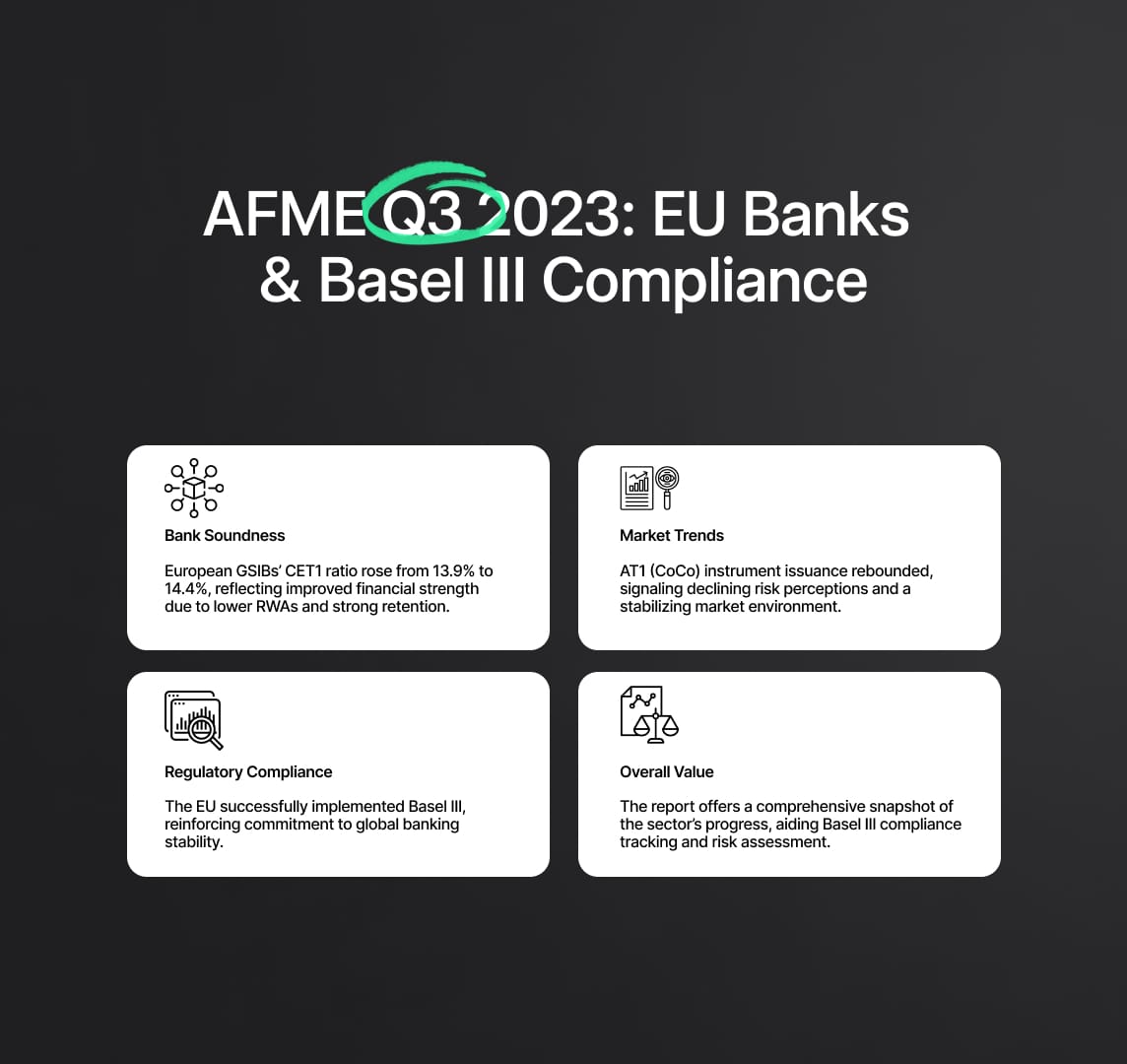AFME Basel III Compliance Progress
AFME's Q3 2023 report highlights significant progress in Basel III compliance within European banks. Key findings include improved CET1 ratios and a revival in AT1 instrument issuance, indicating a robust, resilient banking sector poised for growth and stability.

EU Banking Sector : Basel III Compliance in AFME's Latest Q3 2023 Report

The thorough prudential data report for the third quarter of 2023, released by the Association for Financial Markets in Europe (AFME), highlights a number of encouraging changes in the European banking sector. For anyone involved in Basel III compliance and the general state of the banking industry, this paper is especially important.
The report's noteworthy increase in the endpoint CET1 ratio among European Global Systemically Important Banks (GSIBs) is one of its main highlights. This ratio, which is an important indicator of bank soundness, increased positively from 13.9% in the last quarter of 2022 to 14.4% in the third quarter of 2023.
This improvement is unmistakably a sign that these institutions have a more solid and resilient financial basis. According to the paper, the main causes of this upward tendency are the decrease in risk-weighted assets (RWAs) and the efficient retention of earnings. It also mentions that the impact of interim dividends and buyback plans has somewhat offset this gain.
The paper also discusses the rebound in the issue of AT1 instruments, a type of contingent convertible (CoCo) securities, in addition to these conclusions. The financial markets' stability depends on a decline in risk perceptions and a positive indication of market normalization, both of which are represented by this revival.
Most crucially, the agreement on the successful implementation of the Basel III framework inside the European Union is celebrated in the AFME report, marking a critical milestone in regulatory compliance. This development demonstrates the banking industry's continued dedication to upholding these international norms, which are intended to strengthen the stability and resilience of the world banking system.
Professionals and analysts keeping an eye on Basel III compliance will find this study to be quite helpful in understanding the current and projected status of the European banking industry. Its thorough analysis not only demonstrates the industry's dedication to upholding strict financial stability standards, but it also emphasizes the ongoing efforts made to fully comply with Basel III laws.
The Q3 2023 prudential data report from the AFME is, all things considered, a valuable tool for learning about the dynamics of Basel III compliance and the state of the European banking sector. It ensures that stakeholders are aware and ready to handle the changing financial landscape by painting a clear picture of the accomplishments to date as well as the obstacles still to be overcome.
Basel III Compliance: Detailed Analysis from AFME’s Q3 2023 Report
A thorough prudential data report covering the third quarter of 2023 has been released by the Association for Financial Markets in Europe (AFME), providing insightful information on the level of Basel III compliance in the European banking industry. With its extensive analysis of the regulatory environment and the state of European banks in relation to Basel III criteria, this research is an invaluable tool for stakeholders.
In-Depth Look at Basel III Compliance Trends
Boosting Capital Adequacy: The main finding of the paper is that European Global Systemically Important Banks (GSIBs) have a significantly higher Common Equity Tier 1 (CET1) ratio.
The increase in capital adequacy from 13.9% to 14.4% indicates a significant improvement in the banks' capacity to withstand losses. This crucial component of Basel III compliance not only shows that the banking system is more robust, but it may also have an impact on investor confidence and attract more foreign capital to the industry.
Resurrection in the Issuance of AT1 Instruments: This is a crucial finding from the research that points to a more favorable market climate and a reduction in perceived risks. This pattern draws attention to the continuous efforts made by banking institutions to comply with Basel III requirements, with a particular emphasis on capital structure optimization and upholding required liquidity levels.

Challenges in Basel III Compliance
Although the report presents a favorable picture of Basel III compliance, it also recognizes the underlying difficulties facing the industry. Because of the intricacy of putting Basel III rules into practice, banks must take a flexible and innovative stance. To reduce the risks associated with regulatory uncertainty, it is imperative to maintain the EU's capital market competitiveness and ensure compliance with international norms.
Key Takeaways for Stakeholders
The Q3 2023 prudential statistics report from AFME is a priceless resource for anyone involved in the banking industry. It offers a thorough examination of the developments and continuous difficulties with Basel III compliance.
The research emphasizes how dedicated the European banking industry is to maintaining strict regulatory compliance and strong standards of financial stability. Maintaining and improving Basel III compliance is crucial to the sector's continued stability, expansion, and competitiveness in the global market as it continues to change.
To sum up, the AFME report provides evidence of the banking industry's dynamic nature and the ongoing work required to bring it into compliance with Basel III criteria. It acts as a manual for both investors and banks, emphasizing how crucial regulatory compliance is to maintaining a strong and stable financial system. The report's in-depth research and insights are very helpful in navigating the present financial landscape's complexity.
Reduce your
compliance risks

